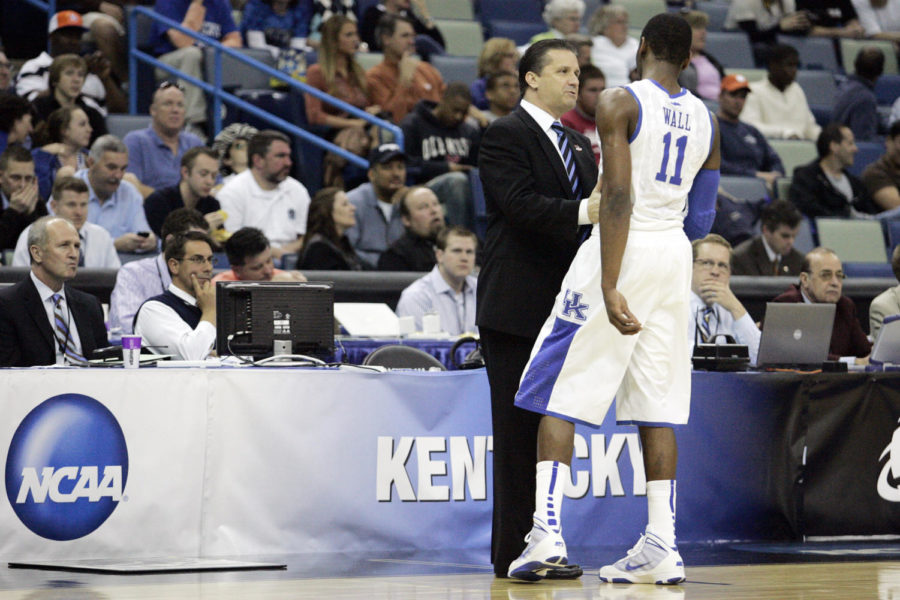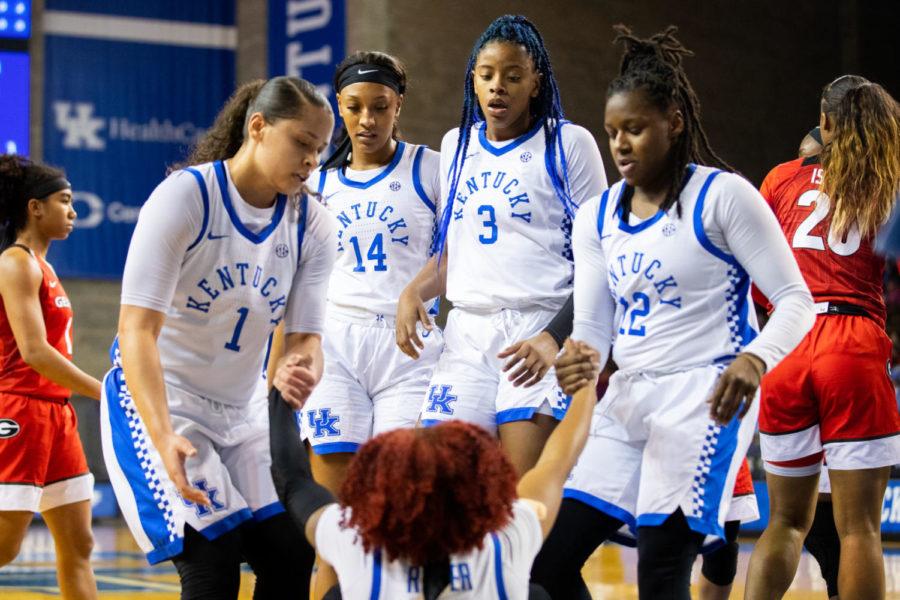UNDAUNTED: Strength in solidarity
September 28, 2021
Scroll through the hashtag #UKWildcatWomen on Twitter and you’ll find dozens of posts shouting out UK-affiliated women that inspire others. The hashtag, first promoted by UK volleyball, recognizes National Brave Day – a day dedicated to honoring women who “lift each other up.”
That kind of solidarity is omnipresent in women’s sports; teams banding together in the face of adversity, professional athletes speaking out against sexist policies. These women share their strength. They have to, if they are going to forge a path through the bias they face in sports.
Olympic silver medalist Mary Tucker knows what that’s like. She faces multiple biases in competition – age, gender and a denigration towards rifle as a sport.
Her biggest role model in handling all those is Jamie Shipley, a two-time Olympian and now Tucker’s personal coach. Being mentored by Shipley has made a huge impact on Tucker because of the similarities in their experiences.
“When she went to the Olympics, she was the same age as me. And she had a lot of the same struggles with being the underdog, being the youngest, being the female and stuff like that,” Tucker said.
Tucker and Shipley have both had to forge a path for themselves. Tucker, now a junior at UK, was the first UK athlete to take gold in both events at the NCAA rifle championship in 2021. Her achievements and Shipley’s equally impressive résumé are a direct rebuttal to the doubts others have about their ability.
“When somebody tells you that you can’t do something, you go and do that, like 10 times over, just because they told you that you can’t do it. And it’s because it’s something that you want to do,” Tucker said. “The two of us have been told a lot – ‘Oh, your goals are too big, or too ambitious, you’re not going to be able to do that.’ And we’ve always done it.”
Even amongst the doubt and derision thrown her way, Tucker has found allies: other female competitors. She said older female athletes come up to her at meets and say they knew she could win.
“They may not have said that prior, or they may not be super out in the open, but just the fact that they will come after and just say ‘I knew you could’ – that they instill that confidence in me is extremely helpful,” Tucker said.
It’s especially validating to hear from athletes who have achieved things Tucker wants to achieve.
There’s a long list of those – Tucker hopes to qualify for the Olympics in both 2024, the year she graduates, and 2028, and if she does would tie the Olympic record for number of games by a female rifler.
“I have been shooting for not very long, so I do have the longevity and the option to go that long,” Tucker said.
Then, she wants to go into coaching and help younger athletes the way Shipley has helped her.
If anyone can attest to the influence of female role models in sports, it’s UK softball coach Rachel Lawson.
Lawson, who has had 13 winning seasons in 14 years as Kentucky’s head coach, grew up with eight older sisters. When she was young, going to her sisters’ games was the only way to get out of the house sometimes.
“I got to run around and pick up foul balls and keep score and all those sorts of things, so that’s really what started me in softball in the first place,” Lawson said. She credits her foundation as a coach to strong parents who supported gender equality – a mother who loved to read, and a “guy’s guy” father that had high expectations for his daughters.
“He was ahead of his time really for a man back then,” Lawson said. “What happened was, all of my sisters were able to develop their own identity, and they all had very strong personalities,” partly as a result of competing for attention and against each other in sports.
As the youngest of the nine, Lawson was able to watch her older sisters and learn from their strength.
“If it was not for my sisters taking that lead and running with it, I don’t think I would be where I am today,” Lawson said. Her success today includes 12 NCAA tournament appearances with UK; before Lawson, Kentucky softball had not had any NCAA tournaments and only 11 top 25 wins. Now, UK has 113 top 25 wins and a win percentage almost double its cumulative years before Lawson.
As a coach, Lawson strives to pass along the lessons learned from her family. She wants her players to succeed in college because these four years are a foundation for the rest of adulthood.
“There’s only one true kind of independence and that’s financial. If you don’t have money, you have to rely on somebody else, and so it’s so important to me that the people that I coach have a career that they love and that they can financially support themselves,” Lawson said.
Another lesson she hopes to pass on is how to take care of one’s happiness and health.
“We want strong independent women, and if they can do that they’re going to have happier lives whichever direction they go,” Lawson said. “Then they’ll be better mothers, they’ll be better workers, they’ll be better bosses, they’ll just be better at everything.”
Often, it’s those roles Lawson mentioned – what women do off the field – that prove their towering strength and courage.
Abby Steiner, who played soccer for UK when she first entered college, remembers idolizing a neighbor, Courtney Jenkins, who played soccer for Ohio State.
“She’s like the first one I can remember where I was like in love with her and everything that she was doing,” Steiner said.
Now fully immersed in the track world, Steiner looks up to Allyson Felix, who has pointed out other barriers put up against women in sports.
Felix is an 11-time Olympic medalist and has the most world record titles by a track and field athlete – 12, one more than Usain Bolt. She’s also the winningest track athlete in U.S. history and, as her performance in Tokyo proved, a giant of the support whose legacy will include a literal passing of the baton to the next wave of U.S. track stars.
But all her success wasn’t enough for Nike to guarantee that Felix’s contract would be protected while she recovered from the birth of her first child.
Felix knew that pregnancy was “the kiss of death” in her sport but refused to give up on her dream. Nike wanted to pay her 70 percent less than before Felix had an emergency C-section, but after Felix published her story in The New York Times, the company expanded its maternity policy to 18 months after birth for female athletes. Felix is now sponsored by Athleta.
“They’re showing that it doesn’t only have to be you as an athlete, there are so many other factors that go into who you are as a person and being an athlete is one of them but so is being a mom and being a wife,” Steiner said. “Being able to bounce back and show that it can be done and the view that it couldn’t is an outdated view that should change.”
It’s this advocacy in addition to their success that makes athletes like Felix into icons, and those icons emblematic of how women in sports support other women.
“When you see other women doing exceptional things, it gives you kind of a license to do it yourself,” Lawson said.
That kind of exposure is something today’s college athletes see all the time, but it was a long time coming.
As collegiate athletes – and successful ones at that – UK’s stars have the same chance to serve as role models for the next generation.
Steiner has younger athletes in both track and soccer reach out on social media for advice. Those interactions are a positive benefit to a technology that most of the time is a platform for sexist comments towards female athletes.
“It’s definitely a rewarding feeling, getting those types of messages and stuff like that, to see how it’s all kind of paying off for something bigger,” Steiner said.
UK gymnast Josie Angeny didn’t realize how much she would impact younger gymnasts until her junior season, when the younger sister of someone she used to train with sent her a letter saying how much she looked up to Angeny.
“I wrote her back and her mom sent me a video of her opening it, and she got so excited, and this video literally made me cry,” Angeny said.
Young girls reach out to Angeny for advice with body image issues because she’s been so open about her own experiences.
“I’ve been able to help them with that. Especially with coaches in this sport, who are so abusive whenever you’re in high school because they have that authority over you, and then you’re trained to take it, your whole life,” Angeny said. “So it’s been really amazing that I’ve been able to reach out to these people and try to help as much as I can.”
Many UK athletes feel a responsibility to help if they can. Volleyball player Maddie Berezowitz said she was a “fanatic” of college athletes when she was younger, so she tries to be the role model she looked up to for other girls.
“I really try to keep in mind that I am that person for probably not lots of little girls, but, a few little girls,” Berezowitz said. “And so I try to do little things right.”
Things like answering Instagram DMs or acknowledging fans at games – “they may not be big things, but for the little girls looking up to you it means that much more,” Berezowitz said.
In turn, the support of the women around them helps UK’s athletes feel seen and encouraged.
That support is more obvious in some sports than others, like the close-knit relationship between doubles partners in tennis.
“That’s the key in doubles – having a partner that no matter, no matter what shot, if I’m able to make or miss the shot, she will always support me,” said UK tennis player Akvilė Paražinskaitė of her partner Fiona Arrese.
Arrese summed up the beauty of that relationship, and the approach of the women at UK, even more succinctly: “If we miss, we miss together.”
Swimmer Lauren Poole said having a mother and aunt who were college swimmers is motivational because she wanted to be like them.
“Her and my aunt will be texting me a ton about like, ‘Oh, well when I swam the times were like this,’ and ‘This is what it was like at my first meet,’ and just having relatives that know the college swimming experience is really, really special,” Poole said.
She was also honored to be on the same team as Asia Seidt, the UK diver who won the 2020 NCAA Woman of the Year award.
“Having strong women around me helped so much, which is why I love that college swim teams are really big,” Poole said. “You have so many women around you to motivate you.”
“Strong women” – that’s a phrase heard again and again at Kentucky. That strength comes not just from athletic prowess, win columns or records, but from carving out a space for themselves. Call it solidarity, call it a sisterhood, call it survival – there’s no denying that when it comes to putting women’s sports on the map, UK’s female athletes have each others’ backs.
UNDAUNTED, a series by Natalie Parks, explores the intersection of gender and athletics with testimony from UK athletes and coaches. Series installments will discuss body image pressures, unequal access, representation, mentorship and double standards between men’s and women’s sports.




























































































































































